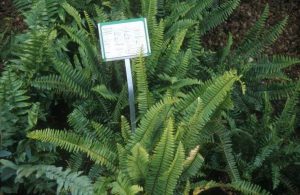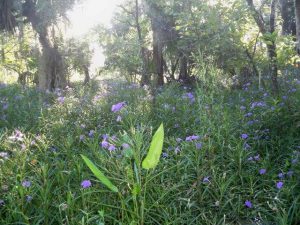Did you know?
Many nurseries sell plants that are invasive or potentially invasive to Florida! In fact, it is perfectly legal to sell many invasive plants – there are only a handful of species that are actually prohibited for sale. That leaves many others that homeowners can unwittingly purchase and plant.
Space Invaders – Yikes!
An invasive species is one that has been introduced outside of its native range and reproduces rampantly, causing severe environmental harm. Invasive plants have no parasites, no predators, and no competitors (think Brazilian Pepper). They multiply uncontrollably within an ecosystem, crowding out native plants and displacing the wildlife species that depend on them. Invasive plants disturb natural processes such as water flow and fire. They invade agricultural crops and alter our shorelines. They cost taxpayers tens of millions of dollars each year in removal fees. The Sunshine State is particularly susceptible to invasive species because of its warm, subtropical climate and its many international ports.
Homeowners contribute to the invasive plant problem when they add invasive species to their yards. These invaders then spread from the neighborhood to natural areas via wind, water, or birds, and proliferate to suffocate our precarious Florida ecosystem.
Fortunately, the Florida Exotic Pest Plant Council (FLEPPC) monitors problem plants and publishes a list of invasive species every two years. Some of the more commonly sold invasive plants are:
- Asparagus fern – Asparagus aethiopicus
- Boston (or tuberous sword) fern – Nephrolepis cordifolia
- Heavenly Bamboo – Nandina domestica
- Lantana – Lantana camara
- Mexican petunia – Ruellia simplex


What Can I Do?
Before you head to your local nursery, check out the full invasive plant list to make sure your chosen plants are not offenders: http://www.fleppc.org/list/list.htm . If they are on the naughty list – don’t despair! The University of Florida has published a substitute list: http://edis.ifas.ufl.edu/pdffiles/EP/EP46800.pdf .
Don’t be tempted by an exotic beauty – plant responsibly!
Sources and References
This article was contributed by Leslie Nixon, a Master Gardener Trainee in Volusia County
Questions? Contact a Volusia County UF/IFAS Master Gardener:
Phone: (386) 822-5778, Monday-Friday, 8:30-4:30
Email: MasterGardener@volusia.org
 0
0
